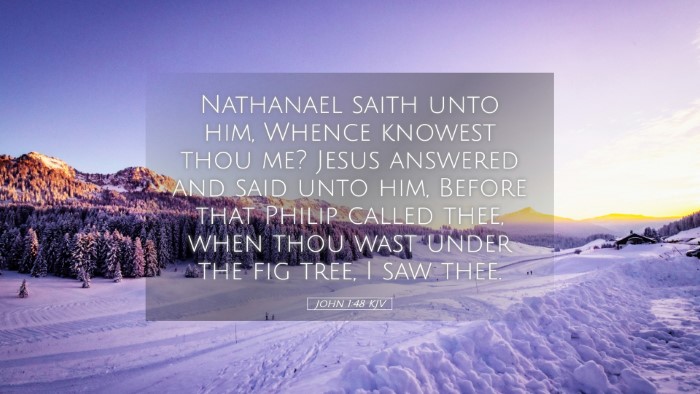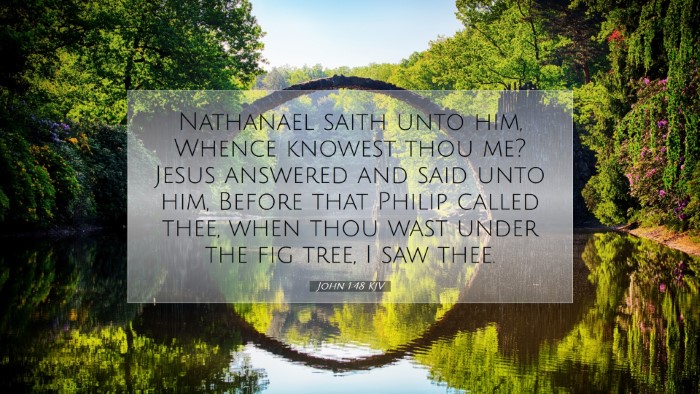Bible Commentary on John 1:48
Verse: "Nathanael said to him, 'How do you know me?' Jesus answered, 'Before Philip called you, when you were under the fig tree, I saw you.'" (John 1:48, ESV)
Introduction
This verse is pivotal within the narrative of John's Gospel, marking a significant moment in the call of the first disciples. It reveals not only the omniscience of Christ but also sets the stage for deeper spiritual realizations. Commentators across the ages have noted the import of Jesus’ words and actions as a demonstration of His divine insight and the awakening of faith in Nathaniel.
Contextual Background
John 1 begins with a majestic prologue regarding the Word (Logos) and introduces the ministry of John the Baptist. Following this, Jesus calls His first disciples, presenting a foundation for the ministry that will follow. Nathanael's encounter with Jesus is unique; it encapsulates both skepticism and immediate recognition of Jesus as the Son of God.
Commentary Insights
Matthew Henry’s Insights
Matthew Henry highlights the significance of Nathanael’s question, "How do you know me?" as it reflects a common human desire for validation and understanding. He emphasizes that Jesus’ response indicates His divine ability to perceive Nathanael’s character and spiritual state, suggesting that God engages with us on a personal level. Henry notes that Nathanael’s prior position under the fig tree symbolizes a place of contemplation, prayer, and perhaps even doubt, contrasting the external world’s expectations with a deeper, internal faith.
Albert Barnes’ Commentary
Albert Barnes expounds on the implications of Jesus' sighting of Nathanael under the fig tree. He observes that this moment reveals Jesus’ supernatural knowledge and understanding of his disciples even before their true conversion experiences. Barnes also explains that the fig tree was a symbol of peace and tranquility, providing a perfect backdrop for Nathanael’s revelation. This symbolizes that even in quiet moments of reflection, the Lord is aware and attentive to our spiritual journeys.
Adam Clarke’s Commentary
Adam Clarke provides a detailed examination of the cultural and spiritual significance of the fig tree. He points out that in Jewish tradition, sitting under a fig tree is often associated with meditation on the Scriptures, implying that Nathaniel was likely engaged in some form of spiritual contemplation. Clarke also emphasizes the profound effect of Jesus' knowledge on Nathanael—indicating a turning point that awakens Nathanael's faith and realization of Jesus’ messianic identity.
Theological Implications
This moment not only signifies Jesus’ divine insight but also serves as a theological anchor regarding the nature of faith and recognition. The dialogue establishes the intimacy of the relationship between Jesus and His followers, suggesting that God is not distant but actively involved in individual lives. The clarity of Jesus' omniscience could strengthen the understanding that faith is rooted in personal experiences and relational engagement with Christ.
Practical Applications
- Personal Reflection: Individuals are encouraged to reflect on their own spiritual journeys and recognize that God sees and knows their true selves, even in moments of doubt.
- Community Engagement: Pastors and teachers should foster environments where believers can share their experiences of God's active involvement in their lives, echoing Nathanael’s transformative encounter with Jesus.
- Encouragement of Inquiry: Nathanael’s question serves as a model for inquiry in the church. Believers are invited to ask genuine questions about faith, spurring deeper theological exploration.
Conclusion
John 1:48 stands as an invitation for individuals and communities of faith to recognize the personal nature of Christ’s call. Biblical scholars, students, and pastors find a wealth of insight in how Jesus meets us—knowledgeably and lovingly—in our respective journeys. This verse reaffirms the significance of faith that arises not solely from the head but from personal encounters with the divine that resonate deeply in the heart.


